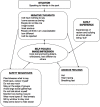Treating social anxiety disorder remotely with cognitive therapy
- PMID: 34191940
- PMCID: PMC7411446
- DOI: 10.1017/S1754470X2000032X
Treating social anxiety disorder remotely with cognitive therapy
Abstract
Remote delivery of evidence-based psychological therapies via video conference has become particularly relevant following the COVID-19 pandemic, and is likely to be an on-going method of treatment delivery post-COVID. Remotely delivered therapy could be of particular benefit for people with social anxiety disorder (SAD), who tend to avoid or delay seeking face-to-face therapy, often due to anxiety about travelling to appointments and meeting mental health professionals in person. Individual cognitive therapy for SAD (CT-SAD), based on the Clark and Wells (1995) model, is a highly effective treatment that is recommended as a first-line intervention in NICE guidance (NICE, 2013). All of the key features of face-to-face CT-SAD (including video feedback, attention training, behavioural experiments and memory-focused techniques) can be adapted for remote delivery. In this paper, we provide guidance for clinicians on how to deliver CT-SAD remotely, and suggest novel ways for therapists and patients to overcome the challenges of carrying out a range of behavioural experiments during remote treatment delivery.
Key learning aims: To learn how to deliver all of the core interventions of CT-SAD remotely.To learn novel ways of carrying out behavioural experiments remotely when some in-person social situations might not be possible.
Keywords: CBT; COVID-19; cognitive therapy; distance therapy; remote therapy; social anxiety disorder; social phobia.
© British Association for Behavioural and Cognitive Psychotherapies 2020.
Conflict of interest statement
The authors have no conflicts of interest.
Figures




References
Further reading
References
-
- Clark, D. M. (2005). Three questionnaires for measuring central constructs in the cognitive model of social phobia: preliminary analysis. Available from Professor David Clark, Department of Psychiatry, University of Oxford.
-
- Clark, D. M. , Ehlers, A. , Hackmann, A. , McManus, F. , Fennell, M. , Grey, N. , … & Wild, J. (2006). Cognitive therapy versus exposure and applied relaxation in social phobia: a randomized controlled trial. Journal of Consulting and Clinical Psychology, 74, 568–578. - PubMed
-
- Clark, D. M. , Ehlers, A. , McManus, F. , Hackmann, A. , Fennell, M. , Campbell, H. , … & Louis, B. (2003). Cognitive therapy versus fluoxetine in generalized social phobia: a randomized placebo-controlled trial. Journal of Consulting and Clinical Psychology, 71, 1058–1067. - PubMed
-
- Clark, D. M. , & Wells, A. (1995). A cognitive model of social phobia In Heimberg G., Liebowitz M. R. M. R., Hope D. & Scheier F. (eds), Social Phobia: Diagnosis, Assessment, and Treatment (pp. 69–93). New York, USA: Guilford Press.
Publication types
Grants and funding
LinkOut - more resources
Full Text Sources
Other Literature Sources
